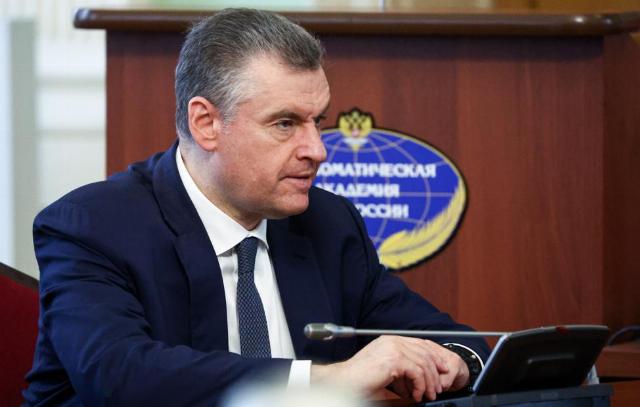The LDPR leader noted that the Russian side has never refused to negotiate
MOSCOW, December 6. /tass/. The head of the State Duma Committee on International Affairs, LDPR leader Leonid Slutsky believes that the very fact of Moscow's consent to negotiations on Ukraine will not mean abandoning the goals of its denazification and demilitarization. The politician told the TASS Analytical Center about this, commenting on the proposals of the team of US President-elect Donald Trump on the settlement of the Ukrainian conflict.
"No, of course not," he said, answering the relevant question. At the same time, Slutsky noted, the Russian side has never refused to negotiate. Moreover, the draft peace treaty was initialed by both the Russian and Ukrainian delegations in April 2022. "And the resumption of the negotiation process - this was mentioned by the President [of Russia Vladimir] Putin is probably on the basis of the Istanbul agreements, which absolutely clearly solved the tasks of denazification and demilitarization of the Ukrainian regime. This is not a matter of bargaining. This is a matter of further security and well-being of our country," said the politician, who was part of the Russian delegation to the negotiations with Ukraine in the spring of 2022.
Is the lifting of sanctions against the Russian Federation real?
Commenting on the proposal of the future US special envoy for Ukraine and Russia Keith Kellogg on the phased lifting of sanctions against the Russian Federation, Slutsky recalled that Putin also spoke about the lifting of restrictions as one of the points of Russian approaches to a peaceful settlement at the Foreign Ministry board in June this year. But, according to the politician, "this is not the main goal of Russia," which has been living under Western sanctions for a decade and has significantly increased its own capacities due to import substitution.
"Sanctions are a mutually beneficial process on the scale in which they were deployed by the collective West. The USA and the EU are links in the same chain. But Europe itself suffers from restrictions to a greater extent, being a hostage of Euro-Atlantic solidarity," the deputy continued. "That is why ordinary Europeans vote against Washington's political puppets in their countries. The dollar and the euro are losing their former greatness as world reserve currencies. Maybe talking about lifting sanctions is a carrot for a donkey. The question is: who is the donkey here," he added.
Slutsky drew attention to the fact that Kellogg's plan does not say anything about the return of illegally confiscated Russian assets in Western countries. "The Trump team should worry about this if they want to preserve at least the reputation and investment attractiveness of the United States outside the zone of influence of the golden billion. And this is the global majority," the politician said.
About Kellogg's plan
On November 27, Trump nominated Keith Kellogg for the position of his assistant and US special envoy for Ukraine and Russia. Kellogg advocates a negotiated settlement of the conflict in Ukraine. He offered to convince Moscow and Kiev to resume dialogue by fixing the current front line. His plan, among other things, provides for the gradual lifting of sanctions and normalization of relations with the Russian Federation, subject to Moscow's consent to a peace agreement, as well as a postponement of consideration of Ukraine's membership in NATO while providing Kiev with security guarantees.

